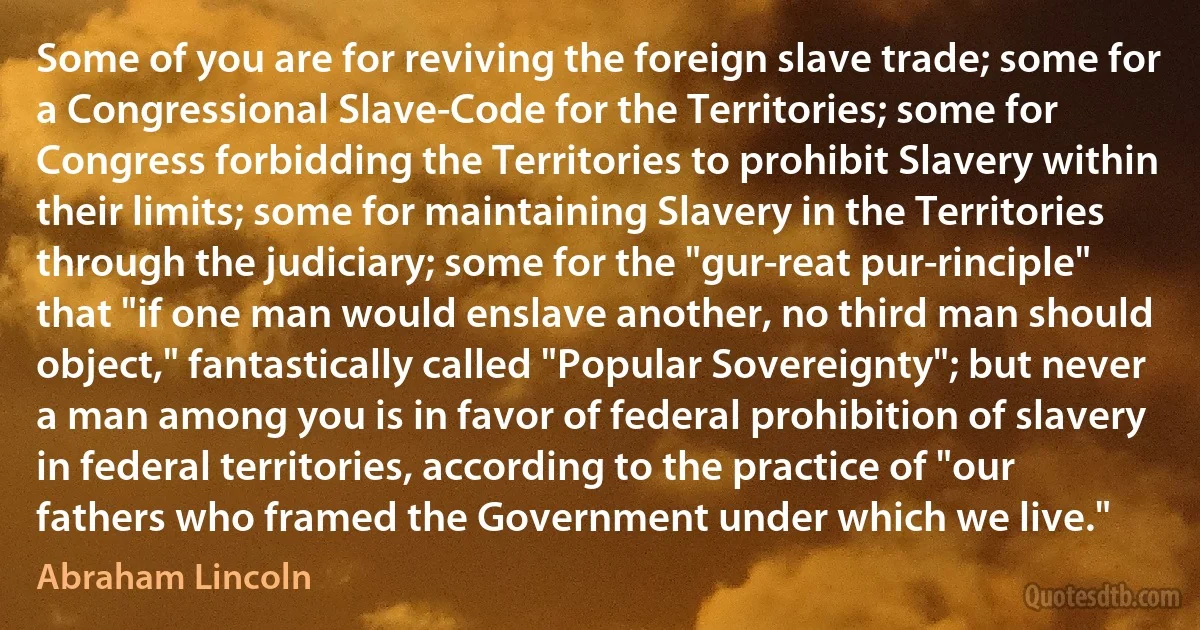
Some of you are for reviving the foreign slave trade; some for a Congressional Slave-Code for the Territories; some for Congress forbidding the Territories to prohibit Slavery within their limits; some for maintaining Slavery in the Territories through the judiciary; some for the "gur-reat pur-rinciple" that "if one man would enslave another, no third man should object," fantastically called "Popular Sovereignty"; but never a man among you is in favor of federal prohibition of slavery in federal territories, according to the practice of "our fathers who framed the Government under which we live."
Abraham LincolnRelated topics
congress favor federal foreign government judiciary live maintaining man practice reviving should slave sovereignty third trade underRelated quotes
What is a charitable heart? It is a heart which is burning with love for the whole creation, for men, for the birds, for the beasts ... for all creatures. He who has such a heart cannot see or call to mind a creature without his eyes being filled with tears by reason of the immense compassion which seizes his heart; a heart which is softened and can no longer bear to see or learn from others of any suffering, even the smallest pain being inflicted upon a creature. That is why such a man never ceases to pray for the animals ... [He is] ... moved by the infinite pity which reigns in the hearts of those who are becoming united with God.

Isaac the Syrian
God always was, and always is, and always will be. Or rather, God always Is. For Was and Will be are fragments of our time, and of changeable nature, but He is Eternal Being. And this is the Name that He gives to Himself when giving the Oracle to Moses in the Mount. For in Himself He sums up and contains all Being, having neither beginning in the past nor end in the future; like some great Sea of Being, limitless and unbounded, transcending all conception of time and nature, only adumbrated [intimated] by the mind, and that very dimly and scantily.

Gregory of Nazianzus
Every Christian should find for himself the imperative and incentive to become holy. If you live without struggle and without hope of becoming holy, then you are Christians only in name and not in essence. But without holiness, no one shall see the Lord, that is to say they will not attain eternal blessedness. It is a trustworthy saying that Jesus Christ came into the world to save sinners (I Tim. 1:15). But we deceive ourselves if we think that we are saved while remaining sinners. Christ saves those sinners by giving them the means to become saints.

Philaret Drozdov
Arithmetic and geometry, according to Plato, are the two wings of the mathematician. The object indeed of all mathematical questions, is to determine the ratios of numbers, or of magnitudes ; and it may even be said, to continue the comparison of the ancient philosopher, that arithmetic is the mathematician's right wing; for it is an incontestable truth, that geometrical determinations would, for the most part, present nothing satisfactory to the mind, if the ratios thus determined could not be reduced to numerical ratios. This justifies the common practice, which we shall here follow, of beginning with arithmetic.

Jacques Ozanam
The real struggle today, just as in the second quarter of the nineteenth century, is between a view of the world termed liberalism or radicalism, for which the primary object of government and of foreign policy is peace, freedom of trade and intercourse, and economic wealth and that other view, militarist or rather diplomatic, which thinks in terms of power, prestige, national or personal glory, the imposition of a culture and hereditary or racial prejudice. To the good English radical, the latter is so unreal, so crazy in its combination of futility and evil, that he is often in danger of forgetting or disbelieving its actual existence.

John Maynard Keynes
